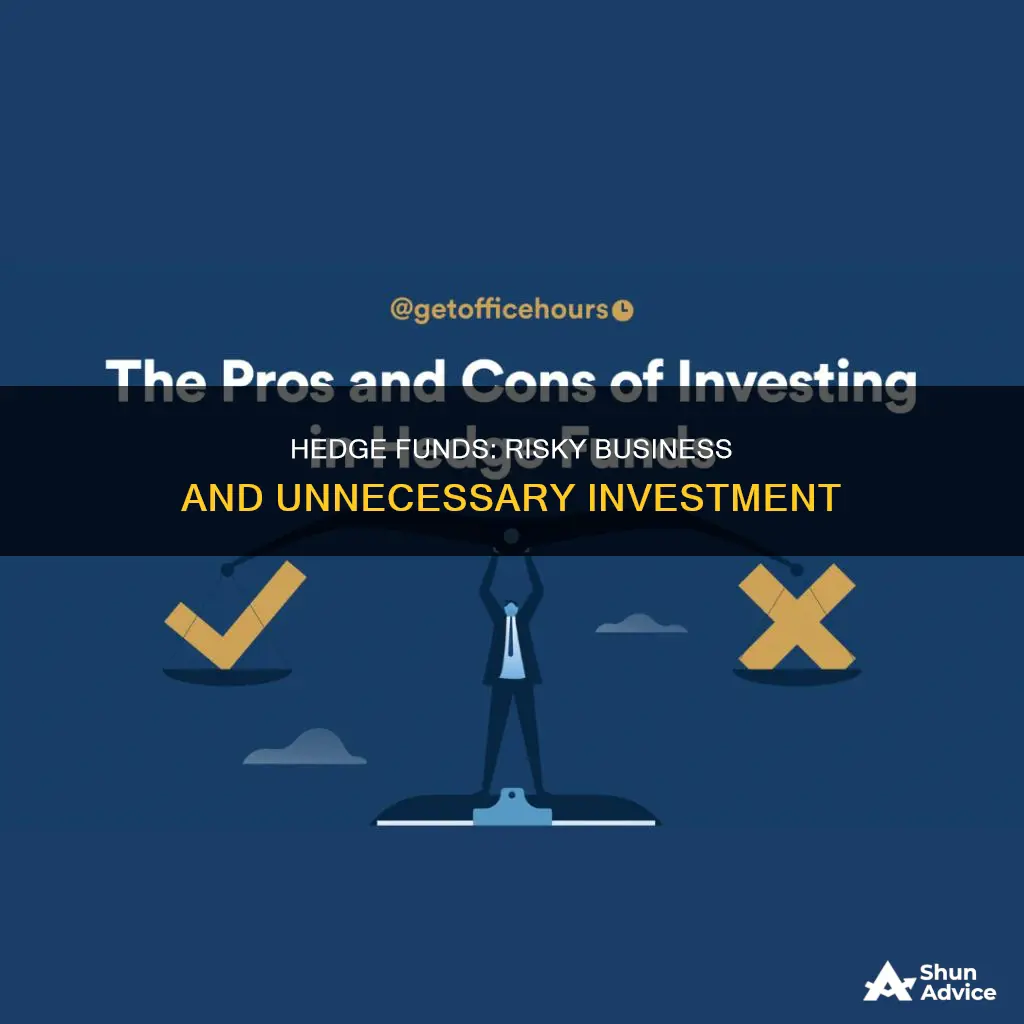
Hedge funds are a type of investment used by wealthy, accredited investors. They are often less regulated and riskier than more traditional investments such as mutual funds. They also tend to have higher minimum investments and costlier management fees. Hedge funds are also known for their aggressive investment strategies, such as leveraged, debt-based investing and short-selling. They can also purchase types of assets that other funds can't invest in, like real estate, art and currency. These strategies come with significant risk and, historically, hedge funds have underperformed stock market indices. For these reasons, hedge funds may not be a suitable investment for everyone.
| Characteristics | Values |
|---|---|
| Risk | Hedge funds are riskier than most other investments. They use aggressive investment strategies like leveraged, debt-based investing and short-selling. |
| Accessibility | Hedge funds are inaccessible to most people due to government restrictions and high buy-ins. They cater to high-net-worth individuals and require large sums to invest. |
| Returns | Hedge funds have historically underperformed stock market indices. |
| Fees | Hedge funds carry hefty fees, including asset management fees (1-2% of the invested amount) and performance fees (20% of the fund's profit). |
| Liquidity | Hedge funds have less liquidity than stocks or bonds and may only allow investors to withdraw their money after a certain time period or during specific times of the year. |
What You'll Learn

Hedge funds are risky and employ aggressive investment strategies
Hedge funds are known for their riskier investments, attracting wealthier investors who are seeking greater returns and are willing to take larger bets. They employ complex strategies involving short-selling, leverage, derivatives, and alternative asset classes to generate returns for investors.
One such strategy is to use leverage or borrowed money to invest. This can magnify a fund's returns if the investment is successful, but it can also magnify losses if the investment fails. Hedge funds also invest in alternative asset classes such as real estate, distressed assets, currencies, and commodities.
Hedge funds are also known for their high fees. A common fee structure is "two and twenty", where investors are charged a 2% management fee per year on the assets being managed and another 20% of the profits.
Hedge funds are not for the average investor. They require investors to have a liquid net worth of at least $1 million or an annual income of over $200,000. They are also less liquid than other investments such as stocks or bonds, with lock-up periods that can last at least a year or more, preventing investors from accessing their funds.
Given these characteristics, hedge funds may be too risky for many investors, particularly those who cannot afford high investment minimums or long lock-up periods, or those who are unable to tolerate higher levels of investment risk.
Vanguard Funds: Where to Invest Your Windfall
You may want to see also

They are loosely regulated and opaque
Hedge funds are loosely regulated and opaque because they are not required to register with the Securities and Exchange Commission (SEC). This lack of transparency makes it difficult for investors to verify a hedge fund's claims and understand how their money is being invested.
Hedge funds are exempt from certain SEC registration requirements because they raise capital through non-public means. This means they don't advertise publicly, and so they aren't subject to the same protections and disclosure requirements that apply to mutual funds.
However, this doesn't mean that hedge funds are completely unregulated. The SEC has sued hedge funds for misrepresenting investment returns, account statements, and fund managers' track records.
The lack of regulation and transparency is one reason why hedge funds tend to cater to high-net-worth individuals or "accredited investors". These investors are presumed to have the financial sophistication to accept the higher potential risk that comes with a lack of regulation.
Accredited investors are defined as individuals with a net worth of $1 million or more (excluding their primary residence) or an annual income of $200,000 ($300,000 if married).
Best Mutual Funds for Short-Term Investment Goals
You may want to see also

They are inaccessible to most investors due to high buy-ins
Hedge funds are inaccessible to most investors due to high buy-ins. They are designed for wealthy individuals and institutions, with minimum investment amounts ranging from $25,000 to upwards of $2 million. The average investor often does not have the financial means to meet these high buy-in requirements.
To be considered an "accredited investor" and gain access to hedge funds, an individual must have a high net worth, typically defined as having a net worth of at least $1 million or an annual income of $200,000 ($300,000 if married). These requirements ensure that investors have the financial sophistication to accept the higher risks associated with hedge funds.
The high buy-ins for hedge funds also serve as a form of protection for less experienced or sophisticated investors. By setting a high financial bar, hedge funds ensure that only investors with a thorough understanding of the risks and complexities involved are able to participate. This helps to safeguard less wealthy individuals from potentially significant financial losses.
Additionally, hedge funds often employ complex investment strategies that may be challenging for the average investor to understand. These strategies can include the use of leverage, derivatives, short-selling, and investing in alternative asset classes. As such, hedge funds are more suitable for sophisticated investors who can navigate these complexities and assess the associated risks effectively.
Furthermore, hedge funds usually charge higher fees compared to other investment options. A common fee structure is the "two and twenty" model, where investors pay an annual management fee of 2% of the assets managed and an additional 20% performance fee on any profits generated. These fees can significantly impact the overall returns, especially when compared to more affordable investment options available to the general public.
In summary, the high buy-ins required for hedge funds make them inaccessible to most investors. They are designed for wealthy individuals and institutions that can meet the minimum investment requirements, understand the complex strategies employed, and accept the associated risks. The high buy-ins also serve as a protective measure, ensuring that only financially sophisticated investors gain access to these risky and complex investment vehicles.
Vanguard Index Fund: Minimum Investment Requirements and Opportunities
You may want to see also

They have high fees and may not outperform the market
Hedge funds are known for their high fees. They typically charge a management fee of 2% per year of the assets being managed, and another performance fee of 20% of the profits. This is known as a "two and 20" fee structure. In recent years, these fees have decreased slightly, with management fees now closer to 1.5% and performance fees closer to 18%. However, even with these slightly lower fees, hedge funds are still significantly more expensive than other pooled investment vehicles.
These high fees can eat into overall returns, especially when compared to index-based ETFs and mutual funds, which have average expense ratios of 0.13%. This means that even if hedge funds do not drastically outperform the rest of the stock market, the high fees can still make them a less attractive investment option.
From January 1994 to June 2023, the passive S&P 500 Index outperformed every major hedge fund strategy by over 2.8 percentage points in annualized return. During this same period, the Credit Suisse Hedge Fund Index lagged behind the S&P 500, with a net average annual performance of 7.02% versus 9.83% for the S&P 500.
Additionally, hedge funds may not always outperform the market. From January 2009 to January 2019, hedge funds only beat the S&P 500 in a single year: 2018. While it is worth noting that this is partly due to the overall market plunge in December 2018, which brought a decade-long bull market close to bear market territory, the fact remains that hedge funds still lost 4.07% in 2018, only slightly less than the S&P 500's loss of 4.38%.
In summary, the high fees associated with hedge funds, combined with their potential underperformance relative to the market, are significant factors to consider when deciding whether or not to invest in hedge funds.
Best Funds to Invest in NPS: Where to Start?
You may want to see also

They are not suitable for the average investor
Hedge funds are not suitable for the average investor due to their high barriers to entry, complex investment strategies, and high fees.
Firstly, hedge funds have high barriers to entry, requiring investors to have a high net worth or annual income. The specific criteria to be considered an accredited investor vary by country and are typically set by regulatory bodies, such as the U.S. Securities and Exchange Commission (SEC). In the U.S., for example, accredited investors must have a net worth of at least $1 million, excluding their primary residence, or an annual income of over $200,000 ($300,000 for married couples). These requirements exclude the vast majority of potential investors, as only a small fraction of the population meets these financial thresholds.
Secondly, hedge funds employ complex investment strategies that involve the use of short-selling, leverage, derivatives, and alternative asset classes. They are less regulated than traditional mutual funds, which makes them even more unsuitable for the average investor who may not fully understand the risks involved. Hedge funds often borrow money to invest, known as leverage, which can magnify returns or losses. They also invest in a diverse range of assets beyond stocks and bonds, such as derivatives, commodities, real estate, and even art. These complex strategies require a sophisticated understanding of personal finance, investing, and trading, which the average investor may not possess.
Lastly, hedge funds charge high fees for their services. A common fee structure is the "two and twenty" model, where investors pay an annual management fee of 2% of the assets under management and a performance fee of 20% of the profits. These fees can significantly eat into overall returns and are typically much higher than those charged by mutual funds or exchange-traded funds (ETFs).
While hedge funds may offer the potential for high returns and diversification benefits, they are not suitable for the average investor due to their high barriers to entry, complex nature, and costly fees. The average investor may be better served by investing in more accessible and regulated investment options, such as index funds or ETFs, which have historically outperformed hedge funds in terms of returns.
Vanguard Target Retirement Funds: Choosing Your Investment Strategy
You may want to see also
Frequently asked questions
Hedge funds are exclusive because they are only available to "accredited investors", i.e., high-net-worth individuals or organisations that are presumed to understand the unique risks associated with hedge funds.
Hedge funds employ complex investing strategies that can include the use of leverage, derivatives, or alternative asset classes, making them riskier than traditional investments. Hedge fund investors are exposed to multiple risks, and each strategy has its own unique risks.
Hedge funds often have high fees. A 2% management fee and 20% performance fee are not uncommon.
Hedge funds can produce higher returns and offer diversification benefits. They also offer strategies that are hard to find in the world of regulated mutual funds and ETFs.







